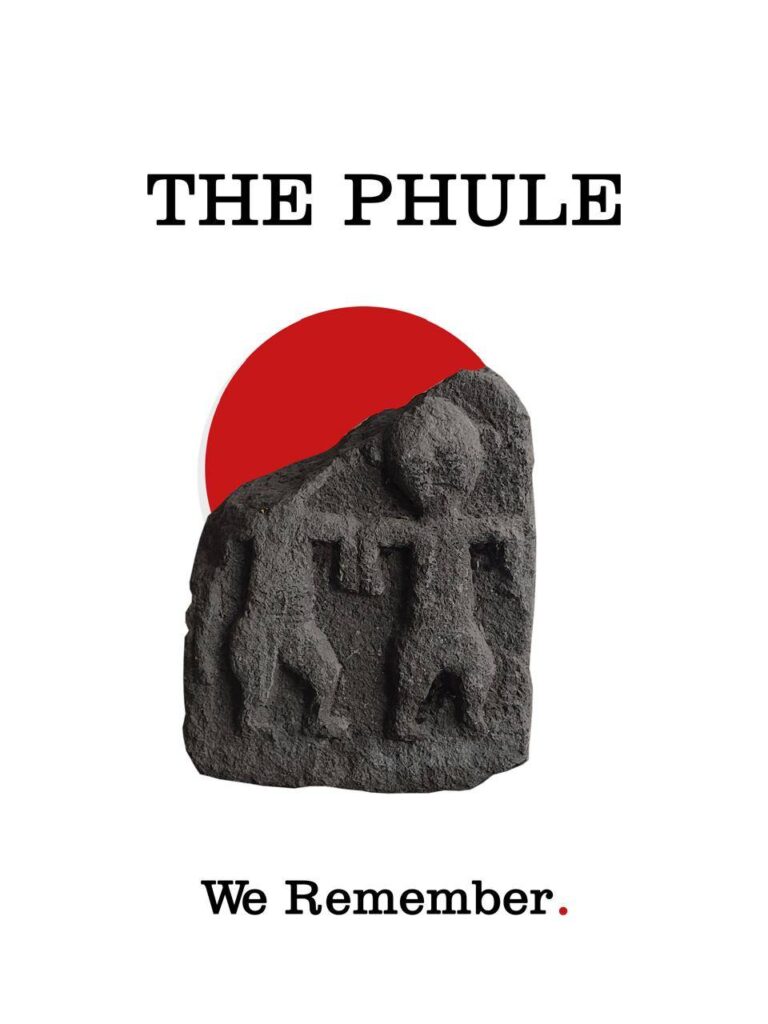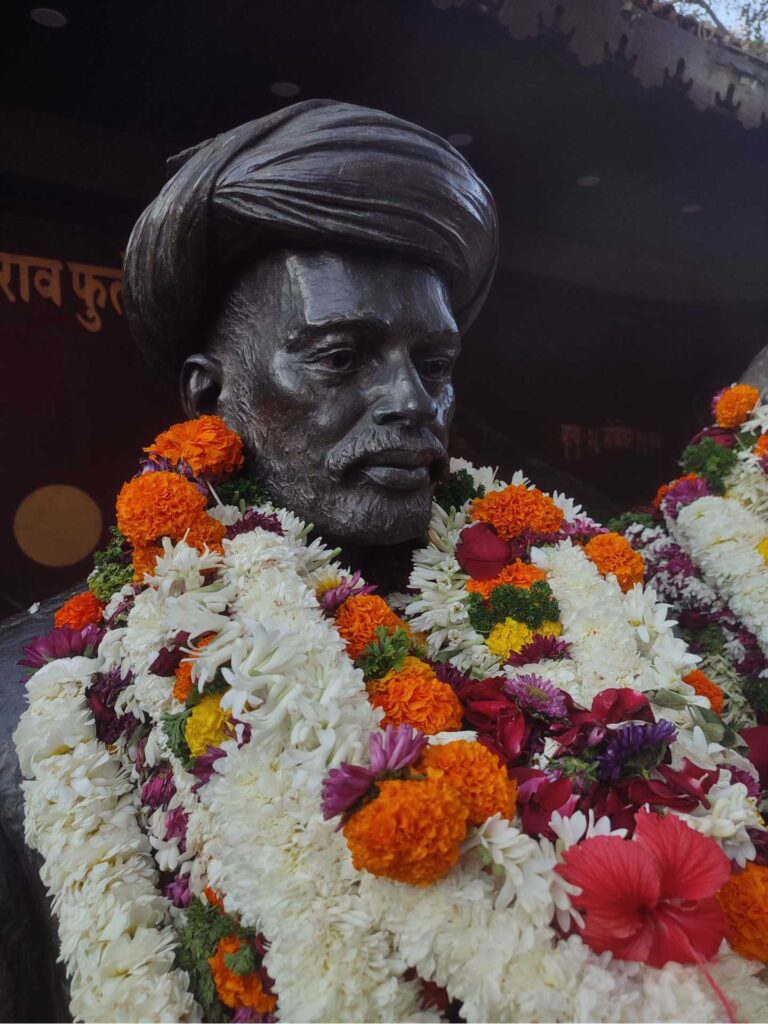[Beginning September 24, The Satyashodhak has been publishing the translation of the Marathi book Amhi Pahilele Phule (ed. Sitaram Raikar, Mahatma Jotirao Phule Samata Pratishthan, 1981) serially. This collective translation is an initiative of the Abrahminical Histories of a City Collective, Pune.]

You are embarking on an expansive biography of Mahatma Jotirao Govindrao Phule, and have requested me to share my recollections to include in the work. I’m writing and sending you the information that I can remember now.
I was born in 1861 in Parner, Ahmednagar. My father was employed in the Military Accounts office. When he was transferred to Belgaum, I arrived in Mumbai at the age of eight. I completed my education in Mumbai whilst living with a relative. In 1878, at the age of 17, I left school and got myself involved in social movements.
My friend, the Late Mr. Ramji Santuji Awate, was 20 years elder to me. Before I left school, he used to write for Late Rao Bahadur Narayanrao Meghaji Lokhande J. P.’s Dinbandhu. After I left school in 1881, we started the newspaper Shetkaryancha Kaivari (Champion of the Farmers) in Mumbai. This newspaper would publish well-written articles promoting the empowerment of peasant and marginalized Bahujan masses. His Highness, Late Sayajirao Maharaj Gaekwad, was made aware of this development by his family physician, Late Dr. Shivappa. He advised His Highness to invite the two youngsters to start a Marathi periodical in Baroda. After shutting down Shetkaryancha Kaivari in the year 1884, both of us friends went to Baroda heeding His Highness’ wish and started the newspaper called Baroda Vatsal. We ran this newspaper for many years. The person who recommended our name, Dr. Shivappa, was a follower of Mahatma Jotiba Phule.
There weren’t many followers of Mahatma Jotirao Phule then. However, the number of followers he gained in his later life was surely larger than during his youth. People had not realised the value of his work by then. The Bahujan masses whose upliftment he strived for, were held back by ignorance. During the time, the rate of literacy amongst the Bahujan masses was not even one percent of what it is today. He worked day and night to ensure the universal propagation of education among the Bahujan people. Belief and conviction in Jotirao’s work started growing, especially amongst his educated followers from the Bahujan Samaj. However, the Samaj, being overwhelmingly illiterate, instead of supporting his work, created more hindrance than help, under the influence of hegemony of the priestly order.[1]Literally the ‘Brahmin Priestly Order’ or, as these Satyashodhak writers imply, ‘The hegemony of the Brahmin elites’ — eds., English edition. Not to mention the crafty opposition from the Brahmanical order and its most ardent supporters, the educated Brahmin class, he had to face in addition! Jotirao had to endure much torment due to the conditions of that time. Hence, it is undeniable that Jotirao had to overcome monumental challenges to forge the path he had envisioned for himself.
During my schooling days, Mahatma Jotirao Phule would visit Mumbai. There were stalwarts like Late Rao Bahadur Narayanrao Meghaji Lokhande, Late Jaya Karadi Lingu, Late Ramayya Venkayya Ayyavaru etc. in Mumbai at the time. They would organise Jotirao’s speeches in Mumbai. I have heard his speeches at numerous places like the Telugu Library in Kamathipura, Phulmali Hall in Byculla, the ground opposite to the Dinbandhu printing press, the Dongri Ground, and at the Raghunath Maharaj samadhi in Mandvi. I would like to note here with great pride that it was his speeches that evoked interest and passion for social activism in me.

Through Dinbandhu, Mahatma Phule would publish his writings on a variety of topics. Dinbandhu gained a distinguished clout due to his articles. His writing was scathing and pertinent, so was his oratory. Through his speeches he used to paint a vivid picture of the exploitation of toiling farmers and labourers by Bhat-Brahmins and moneylenders that took place under all sorts of guises. His speeches would leave his audience spell-bound and enchanted. The public present at the congregation would be deeply impacted by his speeches. He was fearless, outspoken and a proud adherent of Truth. His face was calm and serious. Of medium stature, his eyes sparkled with vitality. On a few occasions, I had an opportunity to speak with him. He had mastered the art of persuasion.
When the Ruler of the Baroda State, His Highness Late Sayajirao Maharaj Gaekwad, came of age and took over the reins of governance of his state, he met Mahatma Phule. His Highness heard Mahatma Phule’s speeches and took cognisance of the many qualities that he possessed. At the time, meetings with Jotirao greatly benefitted His Highness and a close friendship and cordiality developed between the two, which lasted right till the end.
During the time I got to spend in His Highness’ company, I have frequently heard with my own ears Maharaj reminiscing about Mahatma Phule and praising him whole-heartedly. He was very proud of him and held immense respect for Jotirao in his heart. It should especially be noted that His Highness would always laud Jotirao’s commitment to truth, his work and the invaluable sacrifices he made, while addressing his colleagues.
Till date, I have spent most of my life in numerous public service activities, such as writing various books, running newspapers, occasionally giving speeches and publishing useful works and so on. On 16th February 1930, His Highness Sayajirao of Baroda State, felicitated me in his court with a medal and a garment for my humble public service. At that time, I also delivered a lecture on Karmayog (discipline of karma) before Maharaj. In this lecture, I proposed that every human being, after being born, should carry out work like Mahatma Jotiba. The very next day, on 17th February 1930, His Highness had organised a congregation of a few volunteer activists of Satyashodhak Samaj at the Lakshmi-Vilas Palace, for which I was present. After the lecture ended, His Highness himself addressed the audience for half an hour, in which he earnestly advised on how Satyashodhak Samaj’s work could continue. In that speech, he repeatedly alluded to Mahatma Jotirao Phule’s example and lauded his work. After that. he handed over Rs. 200 in cash to one of the invited speakers, Naro Babaji Mahaghat, as a helping hand.
I remember with certainty that whenever His Highness spoke about Jotirao Phule, he addressed him with the reverential title of ‘Mahatma’. He referred to Jotirao as the ‘Adhunik (modern) Mahatma’. He would say, “Jotiba is the first man in this nation who uplifted the Bahujan people from ignorance and enlightened them in the contemporary times. His work is monumental and his sacrifices immense. The welfare and emancipation of this nation is only possible by walking down the same path as the one he has paved with his work. Just as Mahatma Buddha worked for the emancipation of humankind, so did Jotirao, and hence he deserves the title of Mahatma.” Not stopping there, he directed his colleagues in Mumbai to confer the title of ‘Mahatma’ to Jotirao. Accordingly, when Jotirao visited Mumbai in the summer of 1888, to deliver a lecture at the Samadhi of Raghunath Maharaj, he was bestowed with the title of ‘Mahatma’ by the Mumbaikars. I was present at that congregation. This is a testimony to how much respect His Highness carried for Jotirao in his heart, and what a legendary man Jotirao was.
Instead of me describing the greatness of Mahatma Jotirao Phule, the future shall sing it aloud before the people. To secure equal human rights for every human being by ending the exploitation of the Bahujan people was the essence of Jotirao’s work. And achieving this goal, which will ensure the welfare and upliftment of this nation, is the most crucial work that we, the Hindustani populace, must carry forward today, in my humble opinion.
(This memory by Damodar Savalaram Yande has been translated by Gaurav Kalyani, edited by Rucha Satoor and Ninad Pawar, and peer-reviewed by Suraj Thube.)
Notes
| ↑1 | Literally the ‘Brahmin Priestly Order’ or, as these Satyashodhak writers imply, ‘The hegemony of the Brahmin elites’ — eds., English edition. |
|---|
